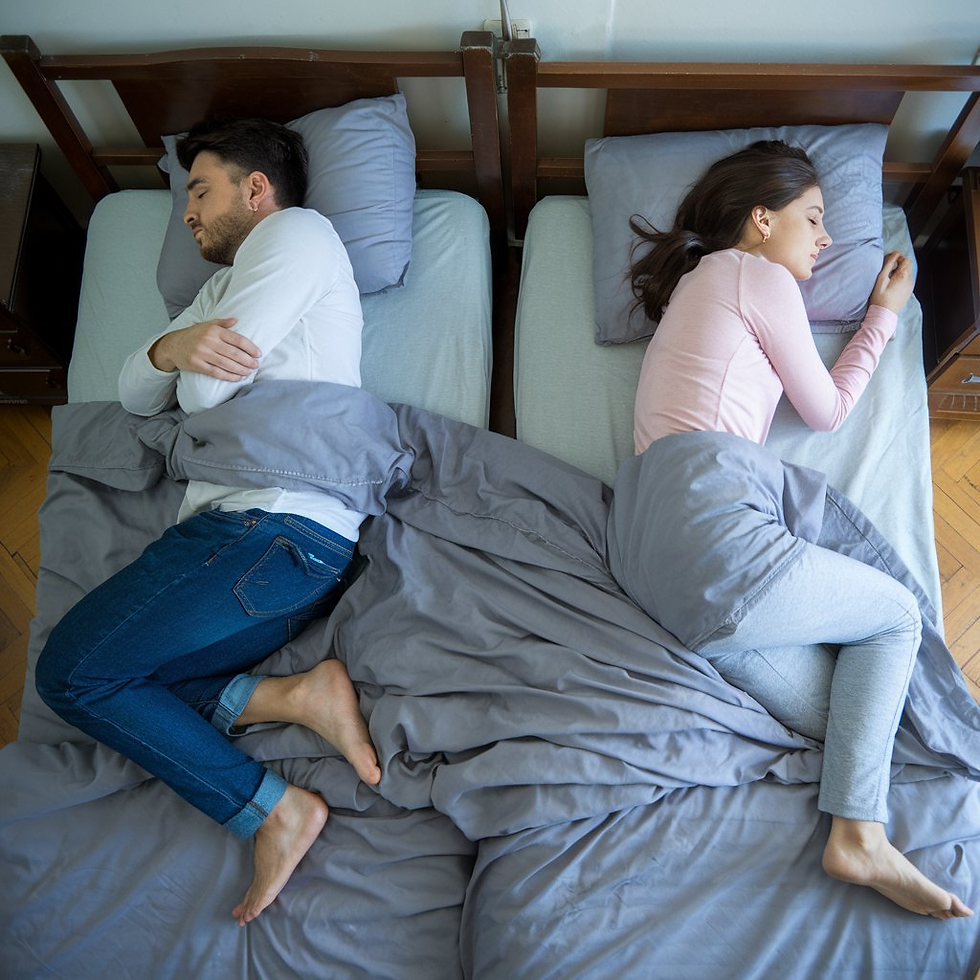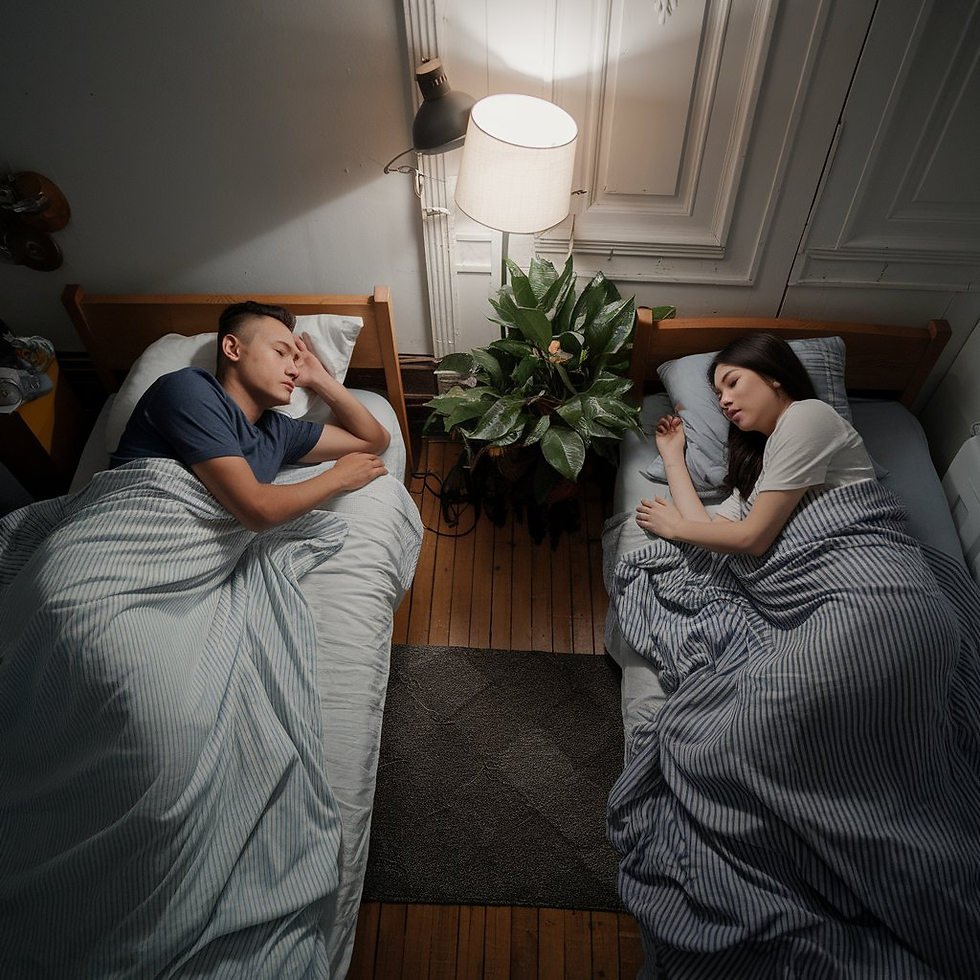Sleep Divorce: A Modern Solution or a Silent Relationship Killer?
- Urvashi Kaushal
- Mar 24
- 7 min read
Why more couples are sleeping apart - and loving it

We've all been there, right? Tossing and turning all night, waking up feeling like we haven't slept a wink. Maybe it's because of a sleep issue, or maybe your partner is a restless sleeper. Sleep is supposed to recharge us, but for some of us, it's turned into a nightly fight. Things like snoring, different bedtimes, sensitivity to light, or just wanting a bit of personal space have led to a growing trend: the "sleep divorce." More and more couples are choosing to sleep apart just to get a good night's rest.
In the past, sleeping apart might have been seen as a sign of a relationship on the rocks, but now it's often seen as a smart move for better sleep and, believe it or not, a stronger relationship. Good sleep is backed by science, after all. The Centers for Disease Control and Prevention (CDC) says that people who sleep less than seven hours a night are more likely to be obese, have diabetes, develop heart disease, and even experience mental distress more often. Plus, a study by the Sleep Foundation found that almost 46% of people who said they didn't sleep well also rated their mental health as poor or very poor. It's no surprise that more people are switching their sleeping layouts, even if it means moving to separate beds.
But is a "sleep divorce" truly the solution? Or are there more effective methods to address sleep problems without resorting to separate bedrooms? This blog will delve into the science linking sleep and health, weigh the advantages and disadvantages of sleeping apart, and offer practical tips to help both your love life and your sleep flourish.
Why Are More Couples Sleeping Separately? Understanding Sleep Divorce
Sleep divorce, where partners choose to sleep alone to improve sleep quality, has gained popularity recently. This trend is especially noticeable in India, where a striking 78% of couples opt for separate sleeping arrangements, topping the global list. Following India are China (67%) and South Korea (65%), as per a sleep survey by ResMed.
The motives behind this change are varied. Common sleep issues like snoring, restless leg syndrome, and conflicting sleep schedules can disrupt a partner's sleep, resulting in fragmented rest and daytime tiredness. A recent study in Scientific Reports (ScienceDirect) showed that folks who shared a bed with someone working the night shift tended to have worse sleep than those whose partners stuck to a regular daytime schedule. This really underscores how being out of sync with your partner's routine can mess with your rest.

It's super important to understand just how much sleep impacts our health. Poor sleep can lead to lower immunity, weak cognitive function, and possibly elevate the chance of chronic health issues. It's also obvious that sleep and mental health are closely related; not getting enough sleep can affect our moods, increase our stress levels, and even make us displeased with life.
To combat these issues, lots of couples are now focusing on good sleep habits. They're doing things like making their bedrooms more sleep-friendly, keeping a consistent sleep schedule, and cutting back on screen time before hitting the hay.
🚺🚹 Sleep Inequality: Why It’s More Than Just ‘Lack of Rest’
Ever wonder why some people seem more exhausted than others, despite getting the same hours of sleep? The answer isn’t just about bedtime routines—it’s about gender, work stress, and biological differences shaping our sleep quality.

🔹 The Gender Sleep Gap – Research from the National Center for Biotechnology Information (NCBI) highlights that women are twice as likely to suffer from insomnia due to hormonal shifts, caregiving duties, and heightened stress levels. Meanwhile, men are more prone to undiagnosed sleep disorders like sleep apnea, which silently deteriorates their long-term health. Another NCBI-backed study suggests that people who share a bed with night-shift workers experience disrupted sleep patterns due to inconsistent schedules.
🔹 Sleep & Career: A Silent Productivity Killer – According to a study published in NCBI, sleep-deprived employees make 40% more workplace errors, experience twice the job dissatisfaction, and face a higher risk of burnout. Poor sleep has also been linked to higher risks of unemployment, showing that rest is just as crucial to career growth as skill-building. The Sleep Foundation also emphasizes that good sleep hygiene improves decision-making, focus, and overall job performance.
Pros and Cons of Sleep Divorce: Does It Really Work?
As more couples embrace sleep divorce, the question arises—does sleeping separately improve relationships, or does it create emotional distance? While the answer varies for each couple, here are the key pros and cons of this growing trend.

✅ Pros: Why Couples Choose Sleep Divorce
✔ Better Sleep Quality – Without disturbances from snoring, restless movements, or mismatched sleep schedules, partners experience deeper and more restorative sleep.
✔ Improved Health – Quality sleep reduces stress, enhances immunity, and lowers the risk of chronic illnesses. Studies link poor sleep hygiene practices to increased heart disease and anxiety risks.
✔ Stronger Relationships – Contrary to concerns, many couples report that sleeping separately reduces conflicts and enhances daytime interactions. Well-rested partners tend to be more patient and communicative.
✔ Personalized Sleep Environment – One partner may prefer a firm mattress, while the other likes a soft one. Separate sleeping spaces allow for customized comfort without compromise.
❌ Cons: Potential Downsides of Sleeping Apart
✘ Emotional Disconnect – Sharing a bed fosters intimacy and physical closeness. Some couples worry that sleep divorce may weaken their emotional bond over time.
✘ Social Stigma – In cultures where sharing a bed is seen as a sign of a strong relationship, sleeping apart can be misunderstood as relationship trouble.
✘ Loss of Spontaneity – Couples who sleep separately may miss out on unplanned moments of closeness, which can be essential for emotional connection.
✘ Not a Solution for All Sleep Disorders – While it can reduce disturbances, sleeping apart doesn’t address the root causes of sleep disorders like insomnia or sleep apnea, which require medical intervention.
A sleep divorce isn’t a one-size-fits-all solution. The key is open communication—if separate sleeping arrangements improve your sleep and mental health, they may be worth considering. However, if they create emotional gaps, exploring sleep hygiene practices together can be a better alternative.
How to Maintain Intimacy While Sleeping Separately
Opting for sleep divorce doesn’t have to mean emotional distance. In fact, many couples find that prioritizing better sleep hygiene practices actually strengthens their bond. Here’s how to maintain intimacy while embracing separate sleeping arrangements.

💑 Prioritize Quality Time Together
Cuddle Before Bed – Even if you sleep apart, spending a few minutes together before dozing off can reinforce emotional closeness.
Morning Check-Ins – Start the day with a warm hug, a shared coffee, or a quick chat to stay emotionally connected.
Plan Date Nights – A well-rested couple has more energy to engage in meaningful activities together, making quality time even more special.
🛏️ Create Shared Sleep Rituals
Wind Down Together – Reading, meditating, or enjoying quiet time before bed can help both partners relax, even if they eventually sleep separately.
Sync Sleep Schedules – Going to bed at the same time—even in different rooms—can maintain a sense of routine and closeness.
Use Sleep-Friendly Gadgets – Noise machines, sleep trackers, or customized mattresses can help partners stay comfortable without needing separate spaces.
💬 Keep the Conversation Open
Be honest about why sleep divorce works for you.
Reassure your partner that sleeping separately is about better rest, not emotional disconnection.
Regularly check in to see if adjustments are needed to maintain both intimacy and good sleep hygiene.
Sleeping separately doesn’t mean drifting apart. By staying intentional about bonding, communication, and shared routines, couples can enjoy quality sleep while keeping their relationship strong.
Sleep Like a Dream: Dos & Don'ts for Couples
💤 Love and sleep don’t have to be a tug-of-war! Whether you’re sharing a bed or opting for a sleep divorce, these golden rules will help you rest easy while keeping your relationship strong.

👍 DO: Because Rested Love is the Best Love
✔ Talk it Out – Discuss your sleep preferences like you would weekend plans—honestly and with compromise.
✔ Create Sleep Magic – Whether it’s matching bedtime routines or cozy separate blankets, prioritize sleep hygiene for better rest.
✔ Snuggle Before Snooze – A little pillow talk or a goodnight kiss can go a long way, even if you sleep apart.
✔ Find the Middle Ground – Noise-canceling headphones, blackout curtains, or separate duvets? Small tweaks = big benefits!
✔ Respect the Sleep Struggle – Sleep disorders are real—if snoring, restlessness, or insomnia persist, seek solutions, not silent resentment.
👎 DON’T: Because Sleep Drama Isn’t Cute
✘ Take It Personally – If your partner sleeps better solo, it’s about sleep, not love. No need for dramatic exits.
✘ Forget the Romance – Separate beds? Cool. Separate lives? Not so much. Keep intimacy alive with shared moments.
✘ Ignore Red Flags – Poor sleep impacts health—don’t let unresolved sleep disorders affect well-being or emotional stability.
✘ Underestimate the Power of Comfort – A better mattress, softer pillows, or a sleep-friendly setup can work wonders before choosing separate rooms.
✘ Let the Screens Take Over – Late-night doom scrolling or binge-watching? Not the kind of third party your bed needs.
Final Takeaway
At the end of the day (or night!), quality sleep and a healthy relationship go hand in hand. Whether you and your partner choose to share a bed or embrace a sleep divorce, the key is understanding, communication, and prioritizing rest without sacrificing connection.
A well-rested mind fosters patience, intimacy, and happiness—so do what works best for you! After all, the real goal isn’t just to sleep together—it’s to dream together.




Commentaires